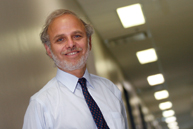Cancer prevention gets attention at McGill
Cancer prevention gets attention at McGill McGill University
User Tools (skip):
Cancer prevention gets attention at McGill
Outreach program arms public with knowledge

Michael Pollak hopes that the combination of research and prevention awareness will give cancer the one-two punch.
Owen Egan
Although treatment now cures 50 percent of cancer cases, the number of new cases increases each year and the disease will kill one in four Canadians. This reality has motivated Michael Pollak to combine cancer research with cancer prevention.
"If cancer were always easy to cure, we wouldn't need prevention," says Pollak, a professor in the Departments of Oncology and Medicine and director of McGill's Cancer Prevention Program. An expert in cancer biology and treatment, Pollak wanted to balance the cancer effort. "With so much focus on treatment, there was an undone job on the prevention side." Although for years there have been individual cancer prevention research projects and clinical activities at McGill, the Cancer Prevention Program was created in 2002 to coordinate these efforts. The first of its kind in Canada, the program integrates basic research in the departments of oncology and genetics with clinical activities.
The clinical work is based at the Jewish General Hospital, with expansion to other McGill Hospitals in the planning phase. At the Stroll Family Cancer Prevention Centre of the Jewish General, the cancer prevention team provides up-to-date medical, lifestyle, nutrition and screening advice to the public. Michael Dworkind co-ordinates lifestyle and environmental risk activities, while William Foulkes, Director of the McGill Oncology Department Division of Cancer Genetics, manages genetic risk activities. Prevention information is available to anyone on a drop-in basis or by appointment. Smoking cessation classes are offered, along with small group sessions, and one-on-one genetic and risk-assessment consultations. For information on the cancer prevention centre see www.mcgill.ca/cancerprev. For a bilingual tool developed with Harvard University to assess personal cancer risk and find advice on risk reduction, see www.cancerprev.mcgill.ca.
On the research front, Pollak's laboratory in the Department of Oncology studies the influence of various hormones, including insulin, insulin-like growth factors, and numerous steroid hormones, on cancer risk. A better understanding of hormonal risk factors may lead to new strategies for preventing cancer. Researchers collaborate with other leading academic centres on many projects, such as an international workshop on hormones in milk that will be held in partnership with the Harvard Center for Cancer Prevention in October (www.milksymposium.org).
Pollak hopes the future will bring important progress. "The ultimate hope is that cancer will be controlled as polio was controlled, with highly effective prevention making the diagnosis a rare one. Personalization of risk reduction strategies may become possible as research progresses. For example, for some people, dietary factors may play a key role, while for others, avoidance of certain environmental carcinogens may be the most important issue." While pleased with the program's accomplishments, Pollak hopes to do more, not only by advancing ongoing research, but also by improving the integration of cancer prevention services within the health care system.
Alison Palmer is a WARM-SPARK writer. WARM-SPARK (Writing About Research at McGill-Students Promoting Awareness of Research Knowledge) is a program Supported by the Vice Principal (Research Office), Associate Vice Principal (Communications), the faculties of agricultural & environmental sciences, arts, engineering, medicine and science. See www.spark.mcgill.ca for more information and articles.
Search
Search (skip):
"The ultimate hope is that cancer will be controlled as polio was controlled, with highly effective prevention making the diagnosis a rare one."Michael Pollak

